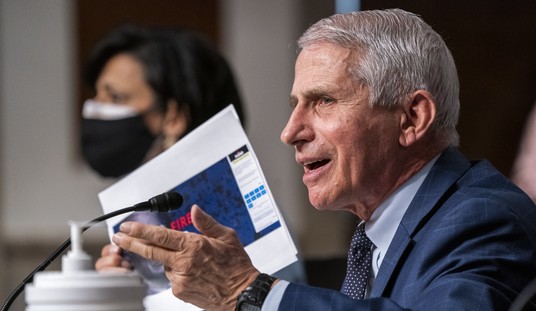Bill Kristol at the Weekly Standard issues a rallying cry this morning for Republicans to run on the basis of repealing ObamaCare in 2010 and 2012. Kristol exhorts opponents of the statist soon-to-be law to make this a central plank of the GOP’s platform for the next two election cycle in his special editorial today:
Luckily, key parts of Obamacare–especially the subsidies–don’t go into effect until 2014. So what Republicans have to do is to make the 2010 and the 2012 elections referenda on Obamacare, win those elections, and then repeal Obamacare.
Of course that can’t be the whole message in 2010 and 2012. Of course there will be other important issues. And even on this issue, the message will have to be not just repeal but also replace–replace Obamacare with sensible reforms. What’s more, working out exactly how to repeal and replace the parts of the legislation that will already be in effect is an important task, one to which I know Paul Ryan has already given some thought.
But the details of the replacing and reforming are secondary. Repeal is the heart of the matter. It should be the heart of the message. Think of it this way: This year Obama has handed Republicans a one-item Contract with America, an item a majority of the public supports–opposition to, and therefore repeal of, Obamacare.
Can this law actually get repealed? The answer is yes, but it’s difficult — and it gets more difficult as time goes on. In fact, while Kristol’s correct in noting that the subsidies and large parts of the benefits don’t go into effect until 2014, the pricing signals will be felt starting today.
First, let’s look at the legislative process. Unless the GOP seizes two-thirds of both chambers of Congress in the mid-term elections, which is mathematically impossible for the Senate, Republicans cannot override a veto on a repeal bill. They probably could pass it in the Senate if they manage to get a small majority this fall using the same reconciliation process Democrats will attempt this week to pass the sidebar fixes to the bill that will get signed into law today, but Barack Obama will veto any such bill outright.
We may defeat Obama in the 2012 elections and hold a larger majority in 2013, although it’s worth noting that few Presidents have been defeated in their bid for a second term in a general election. But by that time, a number of things will have already happened. Insurers will have already passed along higher premium costs to businesses, creating resentment towards Democrats, but also towards the insurers, which will generate sympathy towards greater regulation of the industry. It will also disrupt the existing insurance for all of those added to Medicaid, which means any repeal would necessarily throw people back into uninsured status. Some insurers will probably have left the market, making it more difficult to use market-based reforms. Put simply, a repeal in 2013 will be even more desirable than now, but it won’t be a return to status quo ante, at least not politically.
The Wall Street Journal describes the impact ObamaCare will have on insurers:
While the subsidies don’t start until 2014, many of the new taxes and insurance mandates will take effect within six months. The first result will be turmoil in the insurance industry, as small insurers in particular find it impossible to make money under the new rules. A wave of consolidation is likely, and so are higher premiums as insurers absorb the cost of new benefits and the mandate to take all comers.
Liberals will try to blame insurers once again, but the public shouldn’t be fooled. WellPoint, Aetna and the rest are from now on going to be public utilities, essentially creatures of Congress and the Health and Human Services Department. When prices rise and quality and choice suffer, the fault will lie with ObamaCare.
If repeal doesn’t deal with this fallout, the blame will get transferred from Democrats to Republicans.
I agree that this bill has to be repealed, but let’s not underestimate the difficulties that presents. It will be just as ugly as any real entitlement reform will be, with plenty of opportunity for opponents to demagogue Republicans as heartless meanies that want to strip the poor of their health care. We need to focus first on using Congressional majorities to undo ObamaCare through the budgeting process before it takes place, and encouraging the states to challenge and defeat the bill in the courts for its unconstitutional arrogance. If we rely on repeal in 2013, it’s going to be something very close to too late.
Update: My good friend Ira Stoll sees cause for hope, and relies on what is almost an inevitability — the incompetence of bureaucracies:
Republicans despondent because they think the bill is a government takeover that is about to ruin the American health care system may want to cheer up. First, if the bill is half as terrible as the Republicans say it is, Americans are going to be so upset about it that they blame the Democrats. That will redound politically to the benefit of the Republicans, and it may even make a repeal of the bill possible. Second, even without passage of this bill, health care costs were growing to the point where they were putting pressure on family and government budgets, and it was about to get worse because of the aging of the Baby Boom generation into Medicare. Now the Republicans have a plausible way of blaming the Democrats for all these problems, which were going to happen anyway under the course set by a Republican administration.
As others have said, the Democrats now own every long line, every premium hike, and every medical bill. I doubt that will work out well for them in the end.
Ira ran the late, lamented New York Sun, where I published my first paid columns in print. It was a wonderful newspaper that we sorely need now more than ever, but Ira’s doing great work at his new site Future of Capitalism. Be sure to check it out.









Join the conversation as a VIP Member